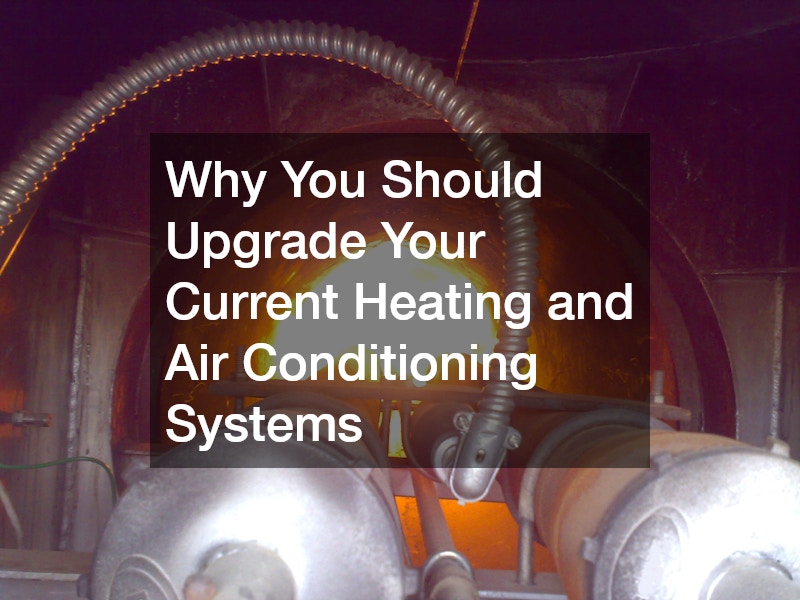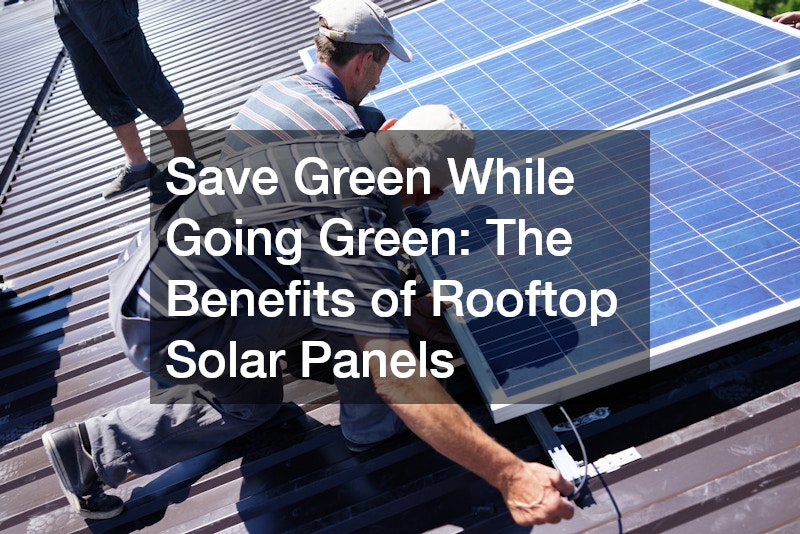Upgrading your heating and air conditioning systems isn’t just about staying up-to-date with the latest technology. It’s about improving your home’s comfort, lowering your energy bills, and reducing your environmental impact. As heating and cooling account for a substantial portion of household energy usage, having outdated or inefficient systems can significantly strain your wallet and the planet. Modern HVAC systems are engineered to deliver optimal performance, ensure consistent indoor temperatures, and offer intelligent features that adapt to your lifestyle. Whether you’re working with a trusted HVAC contractor or a local HV AC company, exploring your options can lead to significant improvements in your home’s energy use and air quality.
What are the benefits of upgrading my current heating and air system?
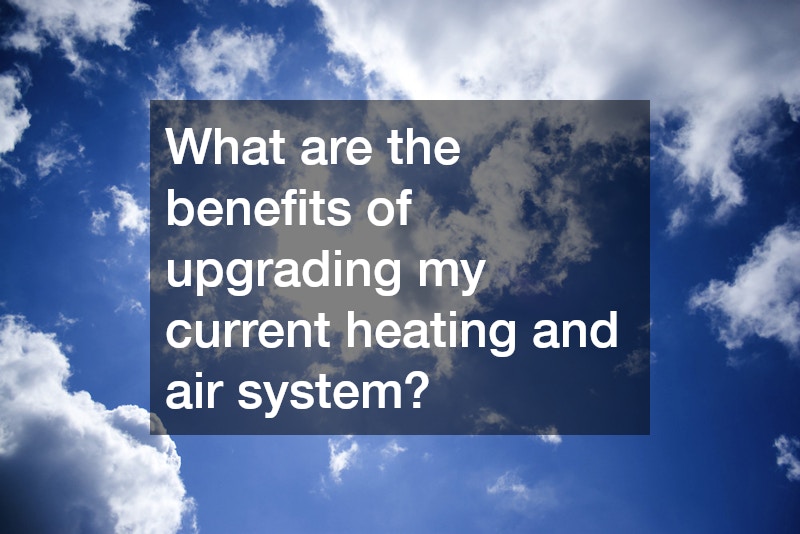
Improved Energy Efficiency
One of the primary advantages of a modern HVAC upgrade is improved energy efficiency. New systems are designed with advanced components that require less energy to produce the same or even better heating and cooling results. Features such as variable-speed motors and high-efficiency compressors ensure that your system works smarter, not harder. Ductless HVAC mini-split systems, for instance, provide individualized comfort for different areas of your home without the energy losses associated with traditional ductwork.
Cost Savings on Utility Bills
With improved efficiency comes a noticeable drop in your monthly utility bills. Energy-efficient HVAC systems use less power, which translates to financial savings over time. Even though the upfront investment may be higher, the long-term cost reductions more than make up for it. Choosing a reputable AC company or HVAC contractor to perform the installation ensures your system operates at peak efficiency.
Enhanced Home Comfort
Modern systems provide more precise temperature control, better airflow, and consistent performance throughout the home. Whether it’s sweltering summer heat or the chill of winter, an upgraded system can maintain your desired indoor climate without sudden shifts in temperature or airflow.
Reduction in Carbon Footprint
Energy-efficient systems contribute to a healthier planet by consuming less energy and releasing fewer greenhouse gases. For environmentally conscious homeowners, upgrading is a meaningful step toward sustainable living. Options like propane heating systems powered by a well-maintained propane tank offer lower emissions and high efficiency.
Increased Property Value
A newly installed, energy-efficient HVAC system is an attractive feature for prospective buyers. It signals a well-maintained home with reduced future maintenance costs, which can increase your property’s market value. Collaborating with a local HVAC company can help ensure that your installation meets local building codes and industry standards.
How often should I upgrade my current heating and air system?
Average Lifespan of HVAC Systems
Most HVAC systems have a lifespan ranging from 10 to 15 years. Beyond this window, the likelihood of breakdowns and inefficiencies increases significantly, making an upgrade a wise consideration.
Signs Your System Needs an Upgrade
Indicators such as frequent repairs, rising energy bills, uneven heating or cooling, and unusual noises suggest your system is nearing the end of its life. These symptoms are signals that it may be time to explore newer options, possibly with the guidance of an HVAC repair service provider.
Technological Advancements
HVAC technology has evolved rapidly in recent years. Even a system that’s a decade old can be significantly outdated compared to today’s high-efficiency, smart-enabled models. Keeping up with technology ensures you’re benefiting from the latest innovations in comfort and energy management.
Manufacturer’s Recommendations
Manufacturers often provide specific guidelines for when to replace their systems. Following these recommendations can prevent sudden system failures and maintain optimal performance.
Impact of Regular Maintenance
While regular maintenance can extend the life of your HVAC system, it cannot offset the benefits of newer technology. Eventually, even the best-maintained systems will become less efficient than their modern counterparts. Regular visits from an HVAC contractor or local HVAC company can help identify the right time for an upgrade.
What new technologies are available in modern heating and air systems?
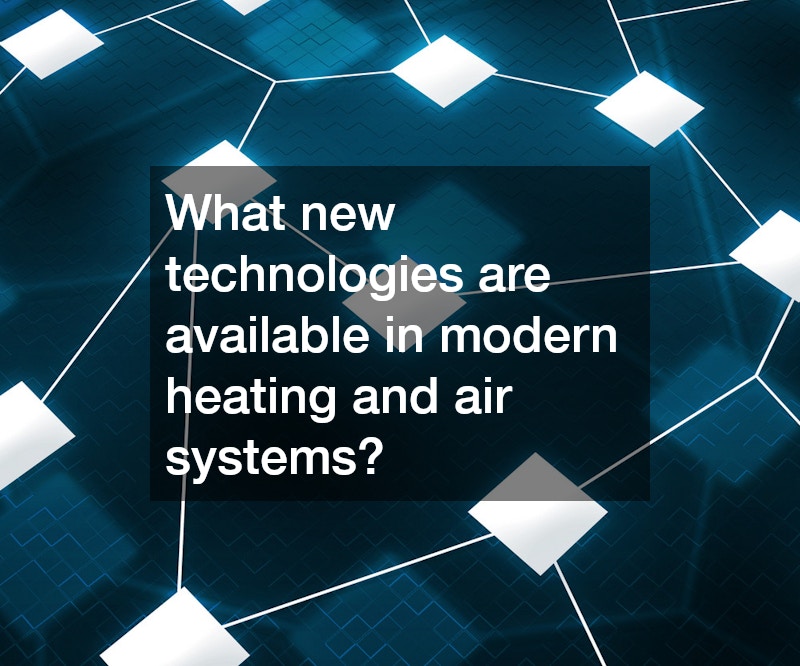
Smart Thermostats
Smart thermostats learn your habits and preferences to create customized schedules that optimize comfort and energy usage. Many models offer remote access via smartphones, voice control, and integration with other smart home devices.
Zoned Heating and Cooling
Zoned systems allow different areas of your home to be heated or cooled independently. This not only improves comfort but also reduces energy consumption by only conditioning spaces that are in use.
Variable Speed Compressors
Unlike traditional systems that operate at a single speed, variable speed compressors adjust their output to match your home’s current needs. This leads to quieter operation, improved efficiency, and better temperature control.
Advanced Filtration Systems
Modern HVAC units come with advanced filtration options that capture dust, pollen, and other airborne pollutants more effectively. These systems contribute to a cleaner indoor environment and are especially beneficial for allergy sufferers.
Integration with Home Automation
Many new HVAC systems are compatible with broader home automation ecosystems. They can interact with lighting, security systems, and occupancy sensors to deliver a cohesive and energy-efficient living experience.
How does upgrading impact energy consumption and utility bills?
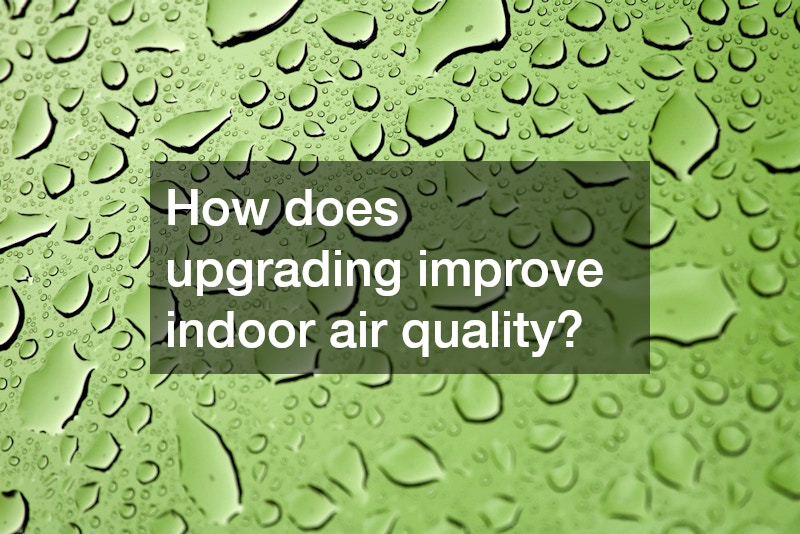
Improved SEER and AFUE Ratings
Seasonal Energy Efficiency Ratio (SEER) and Annual Fuel Utilization Efficiency (AFUE) ratings are critical indicators of an HVAC system’s performance. Newer systems boast higher ratings, meaning they consume less energy for the same level of output.
Energy Usage Comparison: Old vs. New Systems
Older systems can operate at efficiency levels as low as 60%, while modern high-efficiency models can exceed 95%. This dramatic improvement in energy conversion translates into lower monthly energy usage. Homes that switch from heating oil to propane systems supported by local propane suppliers can also see significant efficiency gains.
Long-Term Savings Predictions
Though the initial cost of a high-efficiency system can be steep, the accumulated savings on energy bills over its lifespan often result in a favorable return on investment. Many homeowners recover their initial outlay within just a few years.
Utility Rebates and Incentives
Upgrading to an energy-efficient system often qualifies you for utility company rebates and government tax incentives. These programs help offset the initial investment and make upgrades more accessible.
Reducing Peak Demand Charges
Some utility companies impose extra charges during peak usage hours. Energy-efficient HVAC systems minimize the strain on the grid, helping you avoid or reduce these additional costs.
What are the environmental benefits of upgrading my system?
Reduced Greenhouse Gas Emissions
New HVAC systems use energy more effectively, leading to fewer carbon emissions. By upgrading, you actively contribute to the reduction of pollutants that harm the environment.
Usage of Eco-friendly Refrigerants
Modern systems use refrigerants like R-410A, which are less damaging to the ozone layer compared to older substances such as R-22. This transition supports global environmental protection efforts.
Contribution to Sustainable Energy Goals
High-efficiency HVAC systems align with broader sustainability targets, including national and international goals to reduce energy consumption and promote renewable energy usage.
Decreased Energy Waste
Outdated systems often operate inefficiently, wasting energy through poor design or worn components. Upgrades eliminate these inefficiencies, making your home part of a larger movement toward responsible energy use.
Reduced Heat Island Effect in Urban Areas
Efficient systems that minimize waste heat and promote proper ventilation can help combat the urban heat island effect, leading to cooler cities and reduced air pollution.
How does upgrading improve indoor air quality?
Better Filtration Systems
Upgraded HVAC systems include multi-stage filtration that captures fine particulates, allergens, and even bacteria. This improves the air you breathe and reduces respiratory irritants.
Enhanced Ventilation
Modern systems are designed to improve airflow and ventilation throughout your home, helping to prevent the buildup of stale air and odors. A local plumber may also assist with ventilation-related plumbing services that enhance your overall indoor air quality.
Reduction in Indoor Allergens and Pollutants
By removing dust, pollen, and other common indoor pollutants more efficiently, new systems create a healthier living space, especially for those with asthma or allergies.
Humidity Control
New HVAC models often include humidity control features that prevent excess moisture or overly dry air, contributing to better comfort and mold prevention.
Mitigating Mold Growth
Consistent temperature control and improved ventilation help reduce the risk of mold development, which is crucial for maintaining a safe indoor environment.
What incentives and rebates are available for upgrading?
Federal Tax Credits
The federal government offers tax incentives for energy-efficient home improvements, including HVAC upgrades. These credits can significantly reduce your tax burden for the year the installation is completed.
State and Local Utility Rebates
Many state and municipal energy providers offer cash rebates for the installation of high-efficiency systems. These programs vary by location but often provide substantial savings.
Manufacturer Discounts
HVAC manufacturers occasionally offer discounts and promotions to encourage the adoption of their latest models. Keeping an eye on these deals can help lower upfront costs.
Financing Options
To make upgrades more affordable, various financing plans are available, including low-interest loans and payment plans tailored to homeowners’ budgets.
Seasonal Promotions
Timing your upgrade during off-peak seasons may qualify you for additional savings, as contractors and manufacturers often provide discounts to boost sales during slower months.
How does upgrading increase the reliability of my heating and air system?
Reduced Frequency of Repairs
New systems are built with modern, durable components that are less likely to fail. This means fewer unexpected breakdowns and lower maintenance costs. Working with a reliable HVAC repair service ensures ongoing reliability.
Consistent Performance Over Time
Modern HVAC units deliver reliable performance year after year, maintaining efficiency and comfort levels with minimal degradation.
Warranty Benefits of New Systems
Upgraded systems typically come with robust manufacturer warranties that cover major components for several years, providing peace of mind and financial protection.
Technological Reliability Enhancements
Advanced diagnostics and smart monitoring features built into new systems can detect issues before they become major problems, ensuring timely maintenance and uninterrupted service.
Access to Professional Support and Servicing
Many HVAC providers offer maintenance packages and service agreements tailored to new systems, ensuring your unit is regularly serviced and in peak condition. A dependable AC company or HVAC contractor is essential for ensuring top-tier servicing.
What should I consider when choosing a new heating and air system?
Sizing the System Properly
An oversized or undersized system can lead to inefficiencies and discomfort. Proper sizing, based on your home’s square footage and layout, is crucial for optimal performance.
Understanding Efficiency Ratings
Learn to read SEER, AFUE, and HSPF ratings to gauge the efficiency of various systems. Higher ratings indicate better energy performance and long-term savings.
Evaluating Brand and Model Differentiations
Not all HVAC systems are created equal. Researching brands and comparing features can help you find the right fit for your specific needs and budget.
Cost vs. Long-term Investment
While upfront costs are important, consider the total cost of ownership, including energy savings, maintenance, and lifespan when evaluating options.
Consulting with HVAC Professionals
A licensed HVAC technician can assess your home, recommend appropriate systems, and ensure proper installation, maximizing your investment. It’s also wise to consult with a local plumber if integrating plumbing services with your HVAC upgrade.
What is the process of upgrading an old heating and air system?
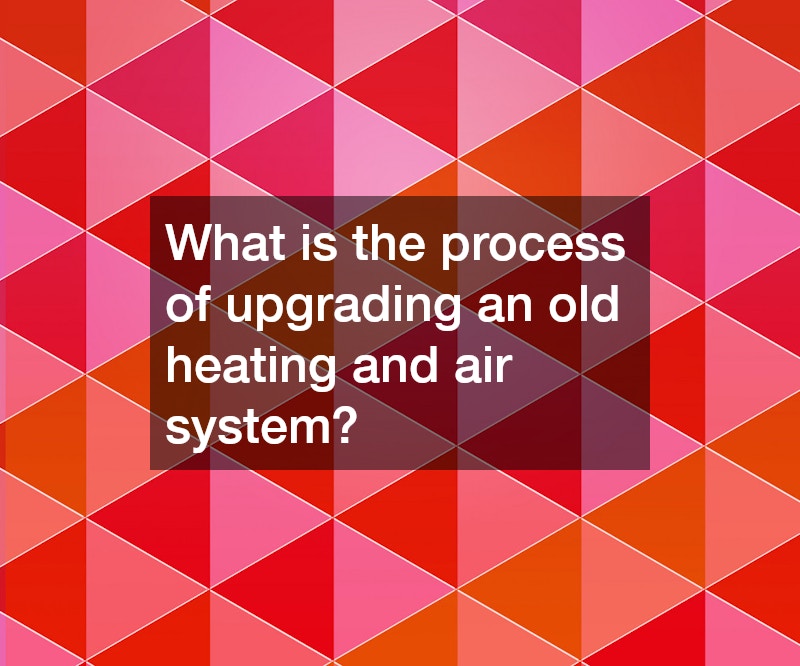
Initial Assessment and Consultation
The first step involves an evaluation of your current system, energy usage, and comfort needs. This consultation helps determine the best upgrade path. In some cases, examining your current use of heating oil or local propane can guide the transition to more efficient alternatives.
Selecting the Right System
Based on the assessment, a suitable HVAC unit is chosen that meets both performance and budget requirements, factoring in efficiency, capacity, and features. Ductless HVAC mini-split systems are often recommended for homes that require flexible installation options.
Professional Installation Process
Experienced technicians handle the removal of your old system and the installation of the new one, ensuring all components are correctly connected and calibrated.
Post-installation Inspection
A thorough inspection follows installation to verify proper function, safety, and compliance with building codes and manufacturer guidelines.
Ongoing Maintenance and Support
After installation, regular servicing keeps your system running efficiently. Most HVAC companies offer maintenance plans to extend the system’s life and maintain warranties. Partnering with a trustworthy local HVAC company or AC company ensures long-term performance and comfort.
Final Thoughts
Upgrading your heating and air conditioning system is an investment in comfort, efficiency, and sustainability. With energy-efficient technology, enhanced indoor air quality, and financial incentives available, there’s never been a better time to modernize your home. Whether your current system is aging, inefficient, or simply outdated, exploring an upgrade can unlock a range of long-term benefits that improve not only your household finances but also your quality of life and environmental impact. Be sure to engage with qualified professionals, including your local plumber and HVAC contractor, to ensure a seamless and beneficial upgrade experience.
